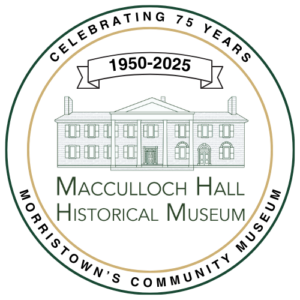Poetry at Macculloch Hall
 Poetry Month at Macculloch Hall
Poetry Month at Macculloch Hall
April was Poetry Month at Macculloch Hall, even though our twenty-year-old series of poetry readings, Poets in the Garden, traditionally takes place in late summer:
“Sweet is the breeze when vernal Zephyrs play,” wrote founder, George P. Macculloch, in 1815, in a thank you note for a pair of fans presented to his wife, Louisa Edwina, and daughter, Mary. Thus began, as far as the museum’s archives show us, a long tradition of poets and “poesy” at Macculloch Hall:
Sweet is the breeze when vernal Zephyrs play,
Dispensing fragrance o’er the sultry day;
But more ambrosial are the genial gales
Where Friendship’s fan its cooling breath exhales.
Flowery stuff, but which breathes of its age and is typical of George’s erudition, if not
his usual subject matter.
By the 1850s, his grandson, Lindley Hoffman Miller, was a serious poet, well known to family and friends. Among his many poems in our archives, is one whose refrain speaks of “…more shadow than I love…” amid a landscape replete with “…the warbled gladness of the thrush, the wild wood-robin’s note.” He ends the poem with:
But even as we Northward go, my
thoughts do Southward move.
An absence casteth on the days
more shadow than I love —
Saturday afternoon
June 21, 1862
Here, Lindley, Macculloch Hall’s Civil War hero, (and later author of the The First of Arkansas Marching Song,) has been mustered in with the Seventh New York Militia for a second tour of duty protecting the nation’s capital, and vulnerable Baltimore. Writing to his new bride, Anne Huntington Tracy, he may be expressing foreboding about the “Cause” he would die for two years later. A note at the top of the page, in another hand, reveals that he took his subject and refrain from “Letter of A.H.T June – 1862,” evidently written before they were married.
Macculloch Hall boasts a third, even better-known poet, Anthony Quinton Keasbey, from Salem, South Jersey. Anthony fell under the spell of “The Old House,” writing a several-page diary of a week spent at the Hall in 1846. Within the next year he had chosen the first of two of George and Louisa Edwina Macculloch’s granddaughters he would marry, fathering eleven of their numerous great–grandchildren.
In 1891, at age 67, he wrote a second tribute to the house, titled, “THANKSGIVING 1891, At the old house”. It sums up the family’s bond with the house in still flowery language to match its Victorian sentiment:
So hither drawn by love today, we come
From other homes made rich and glad by this,
Bringing our sheaves- not lineal heirs alone,
With birth-right bonds – but all whose lives are knit
By this one tie – whose pilgrim steps are borne
Through love and joy and loss, to this one shrine.
Macculloch Hall’s traditional poetry reading will take place on September 18, 2016, with a new feature. We shall treat our audience to one poem from our archives in addition to our two selected poets’ readings and translations from Spanish and Hungarian.

